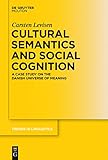Cultural Semantics and Social Cognition : A Case Study on the Danish Universe of Meaning / Carsten Levisen.
Material type: TextSeries: Trends in Linguistics. Studies and Monographs [TiLSM] ; 257Publisher: Berlin ; Boston : De Gruyter Mouton, [2012]Copyright date: ©2013Description: 1 online resource (333 p.)Content type:
TextSeries: Trends in Linguistics. Studies and Monographs [TiLSM] ; 257Publisher: Berlin ; Boston : De Gruyter Mouton, [2012]Copyright date: ©2013Description: 1 online resource (333 p.)Content type: - 9783110294606
- 9783110294651
- 439.810143 22/ger
- P325 .L48 2012
- online - DeGruyter
- Issued also in print.
| Item type | Current library | Call number | URL | Status | Notes | Barcode | |
|---|---|---|---|---|---|---|---|
 eBook
eBook
|
Biblioteca "Angelicum" Pont. Univ. S.Tommaso d'Aquino Nuvola online | online - DeGruyter (Browse shelf(Opens below)) | Online access | Not for loan (Accesso limitato) | Accesso per gli utenti autorizzati / Access for authorized users | (dgr)9783110294651 |
Frontmatter -- Preface -- Acknowledgments -- Contents -- Figures and tables -- Conventions and symbols -- Chapter 1. Danish as a universe of meaning -- Chapter 2. The NSM approach to linguistic and cultural analysis: Key issues in contemporary cultural semantics -- Chapter 3. Roots of Danish sociality: Hygge as a cultural keyword and core cultural value -- Chapter 4. “It’s all about being tryg”: Danish society, socialization and ethnopsychology -- Chapter 5. The dark side of the Danes? A semantic and discursive analysis of janteloven ‘the Jante Law’ -- Chapter 6. Danish cognitive values in a cross-cultural perspective: Evidence from the cognitive verbs synes and mener -- Chapter 7. Are Danes truly the happiest people on earth? Semantics meets “happiness research” -- Chapter 8. Conclusion -- Appendix. Explications and Cultural Scripts in Danish NSM -- Notes -- References -- Author index -- General index
restricted access online access with authorization star
http://purl.org/coar/access_right/c_16ec
Presenting original, detailed studies of keywords of Danish, this book breaks new ground for the study of language and cultural values. Based on evidence from the semantic categories of everyday language, such as the Danish concept of hygge (roughly meaning, ‘pleasant togetherness’), the book provides an integrative socio-cognitive framework for studying and understanding language-particular universes. It is argued that the worlds we live in are not linguistically and conceptually neutral, but rather that speakers who live by Danish concepts are likely to pay attention to their world in ways suggested by central Danish keywords and lexical grids. By means of a sophisticated semantic methodology, the author accounts for the meanings of even highly culture-specific and untranslatable linguistic concepts. The book offers new tools for comparative research into the diversity of semantic and cultural systems in contemporary Europe. Additionally, it contributes to the emerging discipline of cultural semantics, and to the ongoing debates of linguistic diversity, metalanguage, and the use of linguistic evidence in studies of culture and social cognition.
Issued also in print.
Mode of access: Internet via World Wide Web.
In English.
Description based on online resource; title from PDF title page (publisher's Web site, viewed 28. Feb 2023)


